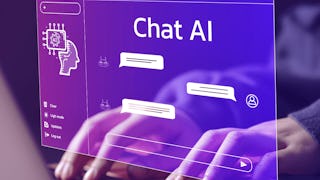- Browse
- Interview
Results for "interview"
 C
CCoursera
Skills you'll gain: Interviewing Skills, Recruitment, Oral Expression, Follow Through, Communication, Business Writing
4.3·Rating, 4.3 out of 5 stars961 reviewsBeginner · Guided Project · Less Than 2 Hours
 Status: Free TrialFree Trial
Status: Free TrialFree TrialSkills you'll gain: Data Structures, Algorithms, Software Visualization, Pseudocode, Programming Principles, Computational Thinking, Theoretical Computer Science, Computer Science, Technical Communication, Communication
4.6·Rating, 4.6 out of 5 stars780 reviewsIntermediate · Course · 1 - 4 Weeks
 Status: NewNew
Status: NewNewSkills you'll gain: Application Deployment, Authentications, CI/CD, Application Development, Interactive Data Visualization, React.js, Full-Stack Web Development, JavaScript Frameworks, Application Performance Management, SQL, Databases, Application Programming Interface (API), User Interface (UI)
Intermediate · Course · 3 - 6 Months
 Status: PreviewPreviewB
Status: PreviewPreviewBBig Interview
Skills you'll gain: Interviewing Skills, Non-Verbal Communication, Applicant Tracking Systems, Professional Networking, Recruitment, LinkedIn, Verbal Communication Skills, Job Analysis, Communication, Professional Development, Negotiation, Rapport Building, Storytelling, Enthusiasm
4.5·Rating, 4.5 out of 5 stars91 reviewsBeginner · Course · 1 - 3 Months
 Status: Free TrialFree Trial
Status: Free TrialFree TrialSkills you'll gain: Prompt Engineering, Prompt Patterns, ChatGPT, Generative AI, AI Workflows, Context Management, Decision Making
4.8·Rating, 4.8 out of 5 stars7.8K reviewsBeginner · Course · 1 - 4 Weeks

Skills you'll gain: Interviewing Skills, Storytelling, Problem Solving, Professional Development, Initiative and Leadership, Concision, Verbal Communication Skills, Teamwork, Job Analysis, Communication, Business Writing
4.6·Rating, 4.6 out of 5 stars426 reviewsBeginner · Guided Project · Less Than 2 Hours
What brings you to Coursera today?
 Status: Free TrialFree TrialU
Status: Free TrialFree TrialUUniversity of Maryland, College Park
Skills you'll gain: Interviewing Skills, Negotiation, Telephone Skills, Recruitment, Communication, Verbal Communication Skills, Compensation Management, Professionalism, Storytelling, Problem Solving, Self-Awareness, Analytical Skills
4.7·Rating, 4.7 out of 5 stars148 reviewsMixed · Course · 1 - 3 Months
 Status: Free TrialFree TrialU
Status: Free TrialFree TrialUUniversity of Maryland, College Park
Skills you'll gain: Interviewing Skills, Negotiation, Telephone Skills, Presentations, Marketing Planning, Oral Expression, Concision, Public Speaking, Professional Development, Applicant Tracking Systems, English Language, Verbal Communication Skills, Persuasive Communication, Strategic Marketing, Business Writing, Cultural Responsiveness, Recruitment, Adaptability, Communication, Writing
4.6·Rating, 4.6 out of 5 stars763 reviewsIntermediate · Specialization · 3 - 6 Months
 Status: NewNewStatus: Free TrialFree Trial
Status: NewNewStatus: Free TrialFree TrialSkills you'll gain: Planning, AI Enablement, Professionalism
4.9·Rating, 4.9 out of 5 stars15 reviewsBeginner · Course · 1 - 3 Months
 Status: Free TrialFree Trial
Status: Free TrialFree TrialSkills you'll gain: Engineering Software, Software Development, Interviewing Skills, Software Engineering, Relationship Building, Professional Development, Application Development, Professionalism, Verbal Communication Skills, Problem Solving, Communication, Back-End Web Development
4.8·Rating, 4.8 out of 5 stars361 reviewsBeginner · Course · 1 - 4 Weeks
 Status: Free TrialFree TrialU
Status: Free TrialFree TrialUUniversity of California San Diego
Skills you'll gain: Data Structures, Graph Theory, Algorithms, Program Development, Bioinformatics, Data Storage, Development Testing, Theoretical Computer Science, Computational Thinking, Network Analysis, Test Case, Programming Principles, Computer Programming, Python Programming, C and C++, Java, Rust (Programming Language), Javascript, Software Testing, Debugging
4.6·Rating, 4.6 out of 5 stars17K reviewsIntermediate · Specialization · 3 - 6 Months
 Status: Free TrialFree TrialU
Status: Free TrialFree TrialUUniversity of Maryland, College Park
Skills you'll gain: Interviewing Skills, Concision, Public Speaking, Persuasive Communication, Cultural Responsiveness, Business Research, Non-Verbal Communication, Professionalism, Negotiation
4.5·Rating, 4.5 out of 5 stars175 reviewsMixed · Course · 1 - 3 Months
What brings you to Coursera today?
In summary, here are 10 of our most popular interview courses
- Preparation for Job Interviews: Coursera
- Coding Interview Preparation: Meta
- Mastering NextJS – Interview Prep & E-commerce Project: Packt
- The Art of the Job Interview: Big Interview
- Generative AI: Prompt Engineering Basics: IBM
- Accomplishment STAR Techniques for Job Interviews: Coursera
- Advanced Interviewing Techniques: University of Maryland, College Park
- Interviewing and Resume Writing in English: University of Maryland, College Park
- Prepare and Practice for Interviews with AI: Google
- Software Developer Career Guide and Interview Preparation: IBM
Frequently Asked Questions about Interview
Jobs related to interviews typically include roles in human resources, recruitment, and career coaching. Additionally, professionals in various fields may benefit from interview skills, such as job seekers, hiring managers, and even those in sales or client-facing roles. Mastering interview techniques can enhance your employability and open doors to new opportunities across diverse industries.
Some of the best online interview courses include the Career Launchpad Essentials: SOP, Resume & Interview Prep Specialization and the Art of the Job Interview. These courses provide comprehensive insights into interview strategies, helping you prepare effectively for various types of interviews.
Typical topics covered in interview courses include common interview questions, behavioral interview techniques, resume writing, and effective communication strategies. Courses may also address specific industries or roles, such as technical interviews for software engineering or product management. Understanding these topics can prepare you for various interview scenarios.
For training and upskilling employees, courses like Effective Hiring: Interview Training for Managers can be particularly beneficial. These courses equip managers with the skills needed to conduct effective interviews, ensuring they select the right candidates for their teams.










